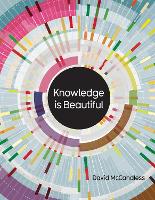


|
|
| book details |
Knowledge is Beautiful
By (author) David McCandless

|
| on special |
normal price: R 710.95
Price: R 674.95
|
| book description |
In this mind-blowing follow-up to the bestselling Information is Beautiful, the king of infographics David McCandless uses spectacular visuals to reveal unexpected insights into how the world really works. We are living in the Information Age, in which we are constantly bombarded with data – on television, in print and online. How can we relate to this mind-numbing overload? Enter David McCandless and his amazing infographics: simple, elegant ways to understand information too complex or abstract to grasp any way but visually. In his unique signature style, he creates dazzling displays that blend facts with their connections, contexts and relationships, making information meaningful, entertaining – and beautiful. Taking infographics to the next level, his new book Knowledge is Beautiful is an endlessly fascinating spin through the world of visualized data, which offers a deeper, more wide-ranging look at the world and its history. Covering everything from dog breeds and movie plots to the origins of life and a timeline of the far future, this stunning book is guaranteed to enrich your understanding of the world.
| product details |

Normally shipped |
Publisher | HarperCollins Publishers
Published date | 25 Sep 2014
Language |
Format | Hardback
Pages | 256
Dimensions | 252 x 195 x 23mm (L x W x H)
Weight | 1010g
ISBN | 978-0-0074-2792-5
Readership Age |
BISAC | reference / encyclopedias
| other options |

Normally shipped |
Readership Age |
|
|
|
To view the items in your trolley please sign in.
| sign in |
|
|
|
| specials |
|
An epic love story with the pulse of a thriller that asks: what would you risk for a second chance at first love?
|
|
|

|
Mason Coile
Paperback / softback
224 pages
was: R 542.95
now: R 488.95
|
A terrifying locked-room mystery set in a remote outpost on Mars.
|
|
|
|